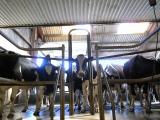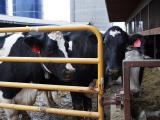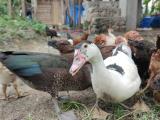Feb 20, 2007 (CIDRAP News) – Following an inspection trip to Nigeria, the United Nations Food and Agriculture Organization (FAO) said today that H5N1 avian influenza is still spreading there and called on the country to increase control measures on farms and in markets.
The H5N1 virus has been confirmed in poultry in at least 10 states over the past few months, the FAO reported in a press release. About 300,000 poultry, including chickens, ostriches, ducks, pigeons, turkeys, and geese, have died of H5N1 infection, and 400,000 more have been culled to prevent the spread of the disease, the FAO found.
Nigeria's confirmation of its first human case and death in late January shows that high-risk practices such as handling sick or dead chickens and poor hygiene during slaughtering expose humans to continuing dangers of H5N1 infection, said Joseph Domenech, the FAO's chief veterinary officer. The case involved a 22-year-old woman from Lagos who reportedly fell ill after handling an infected chicken.
Human cases have occurred in all countries with similar levels of disease in poultry, Domenech said. "The first human case is therefore not unexpected and should not suggest that there is an increased risk to humans. However, it does emphasize the need to increases control of H5N1 in poultry."
The virus probably spread along Nigeria's main trade routes, placing neighboring countries at risk with the movement of birds across borders, the FAO said.
Poultry are brought to markets in Lagos, Nigeria's biggest city with 9 million people, from all over the country. FAO observers found very poor hygiene conditions in the Lagos poultry markets.
The FAO singled out home slaughtering, a common practice in Africa, as a particular risk. Discouraging home slaughtering is one measure that could reduce disease transmission risk to humans, the FAO said. If people do slaughter poultry at home, they should be encouraged to wash their hands, knives, and surfaces.
Control measures in poultry markets, such as veterinary inspections and hygiene improvements, also could reduce the risk of H5N1 infections in humans, the FAO said.
Farmers can prevent the disease from infecting their flocks by disinfecting items brought onto their property, preventing contact between wild birds and poultry, and buying new poultry stock only from sources that are guaranteed to be free of avian flu, the FAO advised.
The agency urged Nigeria to consider targeted poultry vaccination with strict monitoring procedures. The FAO said it is increasing its technical support for avian flu control in the country and has launched a surveillance system there, funded by the European Union.
In other news, authorities in Pakistan closed an Islamabad zoo after detecting H5N1 avian influenza in peacocks and geese, Agence France-Presse (AFP) reported today. A spokesman for the food, agriculture, and livestock ministry, Mohammad Afzal, told AFP an unspecified number of birds from the zoo were being culled.
Marghzar Zoo Director Raja Javed told AFP that 10 birds died suspiciously in the past 2 days, and initial tests were positive for the deadly H5N1 strain. Afzal said test results on four peacocks and one or two geese confirmed the H5N1 virus.
Authorities also reported that 14 or 15 crows died at the zoo and might have spread the virus to captive birds, AFP reported. Tests on those birds have not yet been conducted.
After a 9-month lull, Pakistan reported fresh H5N1 outbreaks in early February among chickens and peacocks at a home in Islamabad, according to media reports. The disease also broke out in backyard poultry in two northern Punjab and North-West Frontier provinces, located in northern Pakistan, according to World Organization for Animal Health (OIE) reports. The country has reported no human H5N1 cases.
See also:
Feb 20 FAO statement
http://www.fao.org/newsroom/en/news/2007/1000499/index.html


















